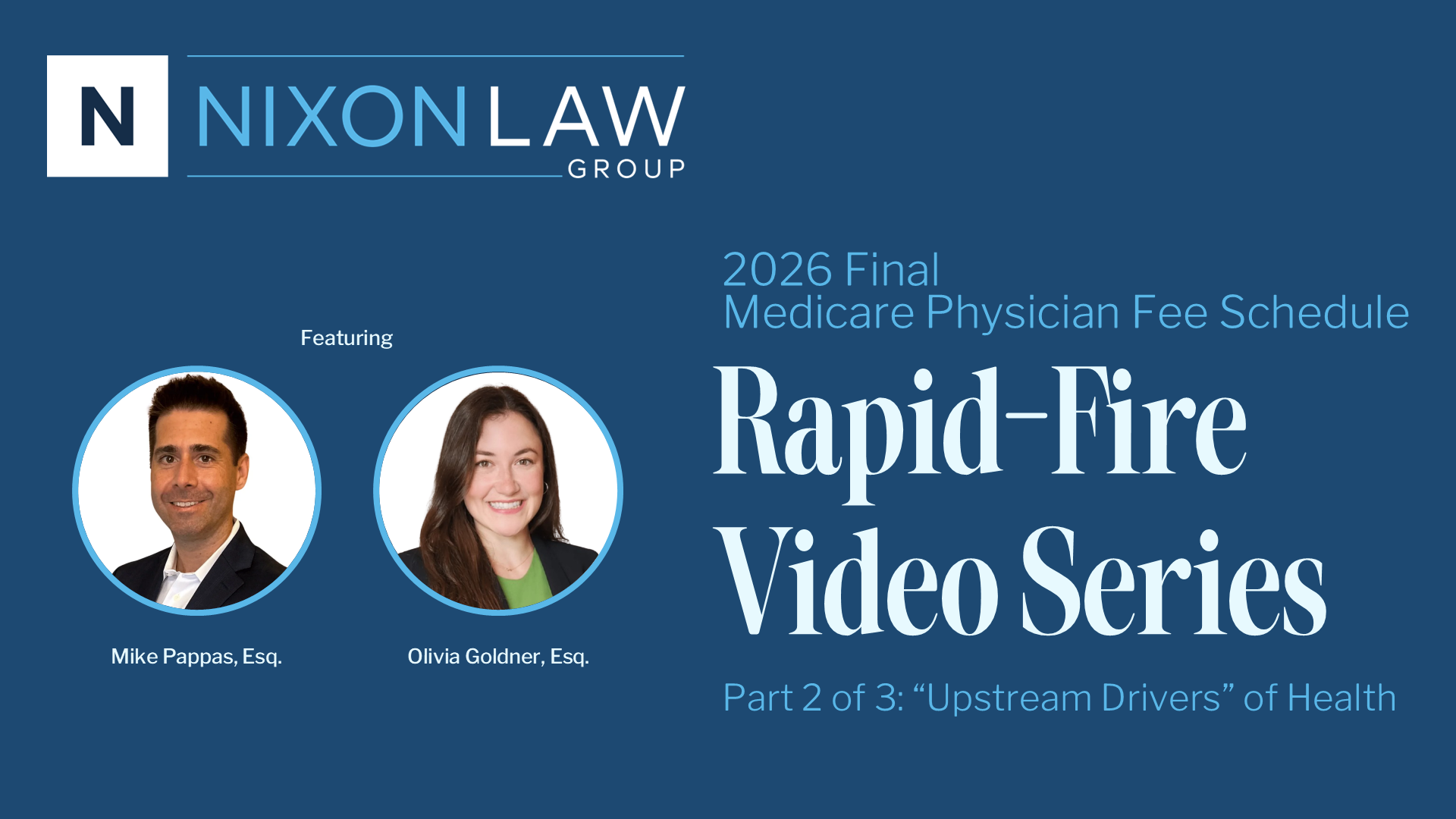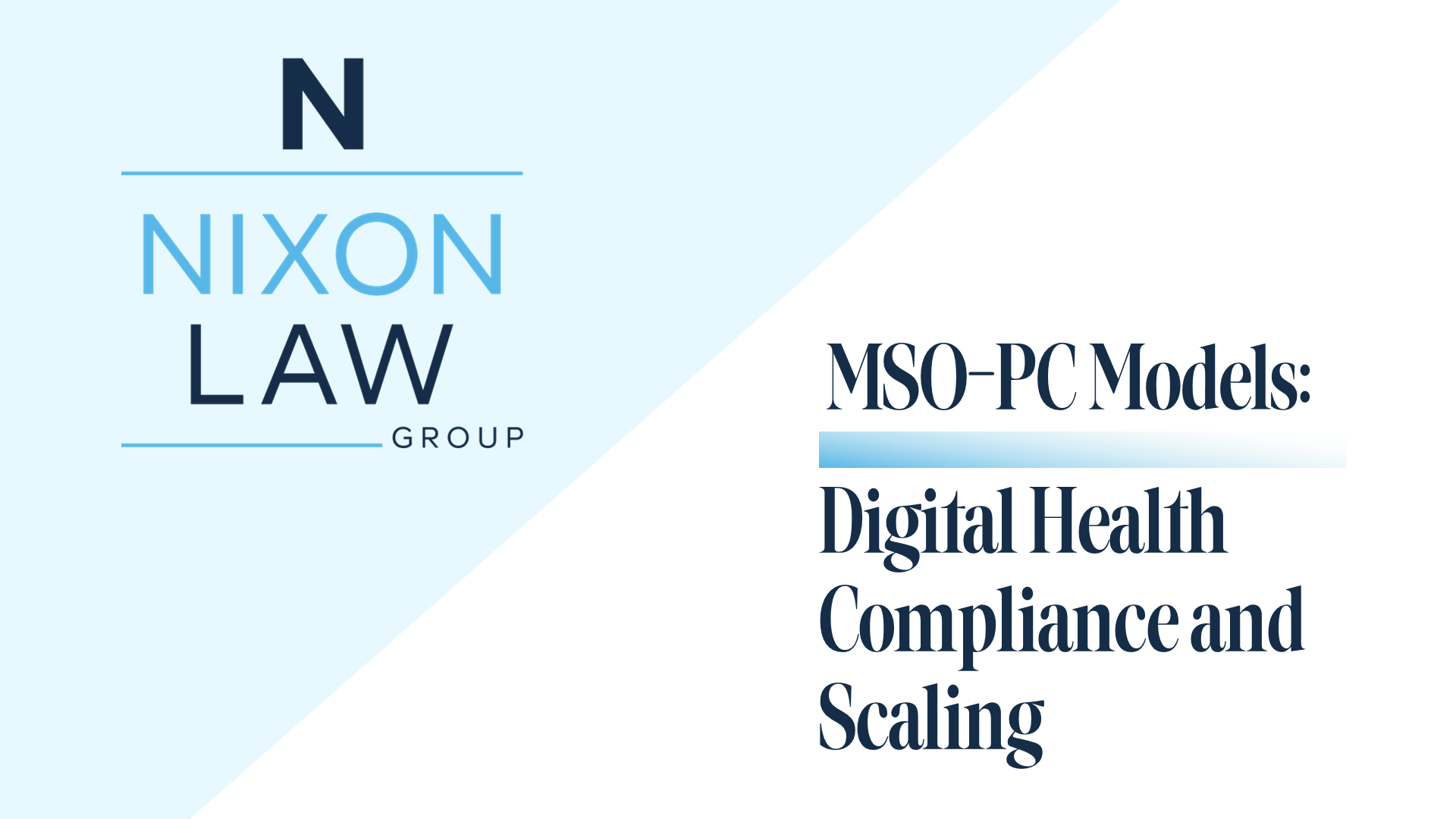
Resources:
Grow in knowledge.

The 2026 MPFS Final Rule: A Pivot Point for Digital Health in RHCs and FQHCs
The CMS CY 2026 MPFS Final Rule ends simplified G-code billing (G0071, G0512) for safety net providers. FQHCs and RHCs must shift to granular CPT/HCPCS coding for virtual check-ins, Chronic Care Management (CCM), and Behavioral Health Integration (BHI). This structural change is a major product roadmap update for digital health vendors serving the rural and community health market. Learn the 4 key billing changes to maintain revenue for your RHC/FQHC partners.

2026 Medicare Final Rule Part 1: Rapid-Fire Q&A on RPM and RTM Codes
The 2026 Medicare Physician Fee Schedule (MPFS) Final Rule introduces some of the most consequential updates for Remote Physiologic Monitoring (RPM) and Remote Therapeutic Monitoring (RTM) since their inception. In Part 1 of our rapid-fire video series, health law experts Carrie Nixon and Reema Taneja break down the most significant changes impacting digital health innovators and care management companies.

2026 Medicare Final Rule Part 2: Rapid-Fire Q&A on Upstream Drivers of Health
The 2026 Medicare Physician Fee Schedule Final Rule confirms CMS’s strong push toward whole-person care, creating new reimbursement pathways for models focused on nutrition, physical activity, and social supports. In Part 2 of our series, Mike Pappas and Olivia Goldner analyze the updates to "Upstream Drivers of Health."

2026 Medicare Final Rule Part 3: Rapid-Fire Q&A on FQHC and RHC Bundled Code Unbundling
Rural Health Clinics (RHCs) and Federally Qualified Health Centers (FQHCs) face mandatory billing changes in the 2026 Medicare Physician Fee Schedule (MPFS) Final Rule. In Part 3 of our series, Stephanie Barnes and Sam Pinson break down the crucial compliance and billing updates that will affect virtual care and care management services in these settings.

MSO-PC Models: Digital Health Compliance and Scaling
Navigating the complex legal landscape of digital health requires a robust and compliant corporate structure. In this video, Nixon Law Group Senior Counsel Reema Taneja provides a comprehensive 101 on the Managed Service Organization (MSO) – Professional Corporation (PC) model, focusing on the critical regulatory hurdles of the Corporate Practice of Medicine (CPOM) and the Anti-Kickback Statute (AKS).

FDA Launches TEMPO: What Digital Health Innovators Need to Know Now
FDA’s new TEMPO pilot creates a flexible, real-world evidence pathway for digital health, SaMD, DTx, wearables, and AI-enabled devices—aligned with CMS’s ACCESS model. Learn how innovators can use enforcement discretion to deploy faster, collect RWD/RWE, and strengthen future FDA submissions.

Inside the Deal: Healthcare VCs to Watch with Kapil Desai – Growth-Stage Capital That Scales
We’re joined by Kapil Desai, Partner at Catalyst Investors, a growth-stage fund focused on scaling high-impact companies in healthcare and beyond. With 11 years at the firm and a family of clinicians behind him, Kapil offers founders a sharp mix of operational insight and provider empathy.
In this episode, he shares how Catalyst evaluates readiness to scale, why capital strategy should serve the business (not the other way around), and what it means to "earn the right to win."

CMS Launches ACCESS Model: The Tools Directory Opportunity for Digital Health Vendors
The CMS ACCESS Model is a 10-year Medicare payment demonstration promoting outcomes-based reimbursement for chronic care management. For digital health vendors—from remote monitoring and wearables to interoperability platforms—the accompanying ACCESS Tools Directory creates a critical, new entry point into the Medicare ecosystem. This post breaks down the shift to Outcome-Aligned Payments (OAPs) and provides a compliance-forward strategy for listing your technology in the Directory to gain visibility and establish trust with Access Model Organizations (AMOs) before the July 1, 2026, launch.

Inside the Deal: Healthcare VCs to Watch with David Kereiakes – Investing in Healthcare Resilience & Innovation
We’re joined by David Kereiakes, Managing Partner at Windham Capital, a leading healthcare investment firm with deep experience across digital health, medical devices, and provider partnerships.
David brings a rare blend of empathy, operational insight, and financial rigor to the venture space. In this episode, he shares how authentic relationships, transparent communication, and a long-term mindset build better outcomes for founders and investors alike.

Implementing a Privacy Program that Scales: Essential HIPAA Practices for Digital Health Companies
HIPAA compliance is more than encryption and security controls—it requires a scalable privacy program that matures as your digital health company grows. Learn how Privacy Risk Assessments, BAAs, staff training, and patient-rights workflows create a competitive advantage in today’s health tech landscape.

CMS Sharpens Focus on “Upstream Drivers” of Health in the 2026 Medicare Physician Fee Schedule
The final 2026 Medicare Physician Fee Schedule (MPFS) solidifies Medicare’s shift toward paying for the assessment and mitigation of "upstream drivers" (e.g., nutrition, housing, social support). Discover how the revised HCPCS G0136 for physical activity/nutrition assessment and the broadened HCPCS G0019 descriptor for Community Health Integration (CHI) unlock new, aligned reimbursement streams for digital health and comprehensive care models. Also, learn how MFTs and MHCs can now initiate CHI services.

FDA Advisory Committee Signals New Regulatory Expectations for Generative AI in Digital Mental Health: What Innovators Need to Know Now
On November 6, 2025, the FDA’s Digital Health Advisory Committee delivered a clear message to the generative AI DMH sector: expect greater structure and tighter oversight. This article breaks down the 6 key themes—including the need for a new risk taxonomy, model drift management, and clinician-supervised use—and provides 5 immediate actions developers, deployers, and investors must prioritize to navigate the evolving regulatory landscape.

How States Are Enforcing New AI Laws in Healthcare—and Why It Matters
States are rapidly passing new laws to regulate Artificial Intelligence (AI) in healthcare, covering everything from mental health chatbots to AI-generated patient communications. The enforcement landscape is fragmented: some states rely on high administrative fines (up to $\$15,000$ per day), others empower Medical Boards, and some even grant a private right of action for consumers. For national digital health solutions, this patchwork of risk requires immediate mapping and proactive AI governance.

Inside the Deal: Healthcare VCs to Watch with Parth Desai – Investing in the Future of Health Tech
We’re joined by Parth Desai, Principal at Flare Capital Partners, one of the largest venture firms dedicated exclusively to healthcare technology. Parth blends a clinical and policy background with deep operational insight from inside major health systems.
In this conversation, he shares how Flare identifies venture-backable startups, evaluates AI and digital health opportunities beyond the hype, and leverages dissent within the firm to make sharper investment decisions.

California Cracks Down on MSOs and Private Equity Influence: What Digital Health Companies Must Know
California has escalated its oversight of Management Services Organizations (MSOs) and private investment in healthcare. With the signing of SB-351 and AB-1415, the state reinforces the Corporate Practice of Medicine (CPOM) by banning interference with clinical judgment and introducing mandatory transaction and data reporting to the Office of Health Care Affordability (OHCA). Digital health enterprises using the MSO-PC model must reassess their structures, workflows, and governance to ensure compliance and avoid penalties.
